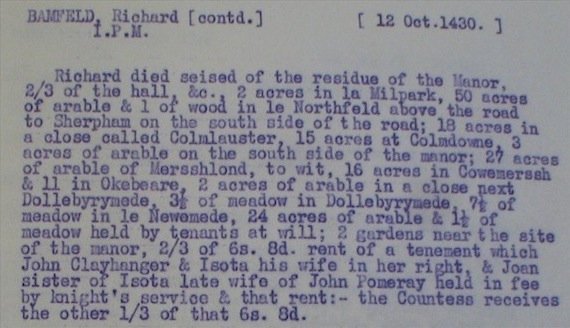Hide
hide
Hide
The Devon Wills Project
(An article prepared for the August 2014 issue of Devon Family Historian - full version)
Richard Grylls and Brian Randell
5 May 2014
Background
In retaliation for the RAF's bombing raid on Lübeck in March 1942, Hitler ordered what became known as the 'Baedeker' raids on picturesque, non-strategically important British cities. One of those was Exeter. On 4 May 1942, in addition to flattening a large part of the city, the Luftwaffe managed to destroy the Probate Registry in Bedford Circus, which had held all the wills and administrations proved in Devon from the earliest times up to 1857. It has been estimated that well over 200,000 wills and administrations were lost. Not long after this disaster occurred, pleas were printed in magazines and newspapers asking that anyone who had a copy of any of the lost wills should send a copy of their copy to the Central Library in Exeter. By degrees, especially once the war had ended, genealogists, historians, family enthusiasts and others, began to root out and make available copies or abstracts of wills they had made before 1942. The number of items submitted grew splendidly, though the total only represented a very modest fraction of the lost documents. Somewhat annoyingly, these collections of abstracts were presented to various different repositories, mostly in Devon, but also in London and elsewhere. Thus, determining the possible whereabouts of copies or abstracts of particular wills or administrations has been a difficult task for family historians researching their Devon forbears.
In mid 2008 there were discussions concerning this regrettable situation between Richard Grylls, a genealogist, the Devon Record Office in Exeter (now renamed the Devon Heritage Centre), the Devon Family History Society, and Brian Randell, Professor of Computing Science at Newcastle University (and the coordinator of the Devon section of GENUKI). A plan was hatched to try to assemble a single large consolidated index which would show the location of all known copies, transcripts, abstracts and extracts of the lost Devon wills and administrations. It was decided early on that this index (or "finding-aid") should also list:
A) All Devon wills and administrations listed in available "calendars'' (i.e. documents known to have existed prior to 1942), whether or not any copy or abstract had been found,
B) All pre-1858 wills and administrations of Devon testators proved outside Devon (e.g. in London),
C) All pre-1858 wills of people who lived outside Devon (e.g. in Cornwall, Dorset and Somerset), whose wills has been proved in Devon.
In March 2009 the Devon Wills Project (DWP) was launched, with Brian Randell and Richard Grylls as its coordinators. An early modification to our original remit was to include in our index the details of post-1857 wills and administrations that we found in various catalogues of the Devon Heritage Centre, when we became aware of the potential confusion caused by the lack of an overall catalogue of the Centre's holdings ofsuch material.
Preparations, establishing Rules and a Template, finding volunteers
The initial effort of the coordinators (with much help from librarians, archivists and the Internet) was to compile a list of all the known sources of Devon testamentary material. Our list is unlikely ever to be complete, since, even now, five years on, new sources occasionally turn up. Many sources, such as a particular issue of a periodical, contain only one or two transcripts or abstracts of wills, while a pre-war family history book might perhaps contain up to a dozen, whereas a fair number of major sources contain information relating to hundreds or even thousands of wills. Unsurprisingly these various sources also differed greatly in the ways that they presented their information, so it was immediately apparent that our project was in many ways a collection of disparate transcription sub-projects. Given the number of minor sources, minor in the sense of containing information on a small number of wills, we in fact found it best to treat these as sub-sources within a single major 'miscellaneous' source. We then created codenames for these sources. For memorability reasons we kept these codes as short and succinct as possible, such as CATH for items from Exeter Cathedral Archives, BASK for items in Basket A at the Devon Heritage Centre (DHC), and MISC for miscellaneous items.
After much discussion and experimentation, a set of transcription rules/instructions was drafted and a spreadsheet template was designed, into which could be inserted all the details we aimed to show about a particular will or administration, e.g. the name and occupation of the testator or intestate, the place of abode, the year of probate or grant, the court where proved/granted, notes about the document itself, and most importantly the code of the source from which these details had been extracted. (This last item ensured that our index could act as a finding-aid, guiding users towards where a given will or administration copy or abstract could be viewed, and how it could be photocopied or photographed.) Our early volunteers carefully 'road-tested' the template and the rules/instructions we had devised. Inevitably both became subject to minor modifications as the various disparate sources were located and tackled.
An issue from the start of the project concerned whether to retain original spellings and original notation. With place-names this was easy - we decided simply to add the present-day standardised spelling in square brackets. The original spellings of surnames were retained, but possible alternative spellings were often inserted as an extra index item, in the hope of helping a user searching for a surname that can be spelt in many ways. Abbreviated Christian names such as Thos., Wm. and Xtian were expanded, to make the alphabetisation process simpler and clearer. Members of the nobility had to be treated carefully, since both titles and normal names were often given. They, along with people whose surname was 'De Something' or 'X alias Y', will usually appear twice in our index.
Towards the end of 2009 requests for volunteers were placed in the quarterly magazine of the Devon Family History Society - whose officers have been generous supporters and collaborators in the whole project throughout - and on the Devon-L mailing list. During the five years the project has been running over 50 volunteers have nobly contributed their services, from Australia, New Zealand, Canada, America, Cyprus and all over the British isles, some helping out for just one source, others coming back for more and more, just like Oliver! Their enthusiasm has been considerable and without their splendid efforts the project would never have taken off.
How were we going to engineer an 'assignation' between our volunteer transcribers and the sources we had found? Fortunately several of the major sources we had located had been microfilmed by the Church of the Latter Day Saints (LDS). They very kindly provided CDs of their films. We were then very fortunate in finding Ken Ozanne, an Australian family history enthusiast and photographer, who kindly offered to photograph a number of other major sources for us during his annual visits to Devon and other archives, his photographs later being transferred onto CDs. We were thus in the happy position of having disks available that could be sent to volunteers worldwide. In addition, some other sources, e.g. catalogues of a number of different county record offices, were already accessible online.
In a few cases we were fortunately able to obtain copies of existing computer-based will indexes. Among these was the National Archives' file of PCC wills (PROB 11), from which we extracted all the Devon items. (Such indexes needed considerable 'processing' to make them conform to our template.) We also obtained from the National Wills Index (NWI) digitized versions of Fry's pre-war calendars of wills proved in Exeter, in exchange for the transcript of Beckerlegge's Calendar of Barnstaple Wills which a group of our volunteers had produced.
The Project under full-sail, and dodging the rocks
We undertook a great deal of online searching for Devon wills and administrations. The web was searched as a whole, also several large collections of online out-of-copyright books, plus the online catalogues of numerous archives. As is often the case on the internet, it was difficult to 'focus' and restrict the results of searches. All too often searches would return 'hits' not just for the term 'will' (as a noun) but also words such as 'William' or 'willing', or the verb 'will'. Similarly we could rarely ensure that our searches on the word 'administration' were confined to probate administrations. Thus, despite the effort that was put into such searching, and the fact that we had many successes, we are sure that more Devon will abstracts and transcripts remain to be found, and that over time more will be added to the web, especially as and when further pre-war family history books are digitized and made available online.
Since a particular will often appears in more than one source, inevitably 'duplications' exist in large numbers in our index. A testator may well have been merely listed in one source (such as one of the Devon calendars), whereas another source or sources may have included an actual abstract, copy or transcript of that testator's will. Sadly, this means that the total number of individual wills and administrations covered by our index is significantly smaller than the number of actual entries in the index. We have made no attempt to identify and remove the 'duplicated' entries. We trust that, in most cases, users will find it easy to pick out the listing that leads them to acquiring a copy of what they want.
Another interesting issue arose because many of the sources from which we extracted information were not original. Indexes, transcripts, lists and printed calendars naturally all contain errors, and in the vast majority of cases there was no original will to consult to be sure what was actually written. One particular example of this was a modern index of Inland Revenue administrations kindly provided to us by the National Archives. It became evident to us that this index had been compiled by transcribers with a limited knowledge of Devon surnames and place-names. In this case the original documents do still exist, though they were compiled by clerks some of whom had decidedly poor handwriting. So the whole index provided by the National Archives was checked and revised. Unfortunately the inaccurate index the National Archives provided is still in use on their website, making it difficult for us to direct people to the correct (actually incorrect!) entry.
One further excitement arose from Miss Olive Moger's valiant efforts during the late 1940s to abstract information from court case papers, cases concerning wills. This set of hand-written volumes, called Moger's Abstracts of Testamentary Causes, is held at the Devon Heritage Centre. In some cases, the original papers that survive (which Miss Moger studied) did not include clearly the name of the testator. This was certainly a challenge for our volunteers, and has on occasion involved some educated guesswork.
Here is a small extract from our DWP index showing one will and four administrations:
| Surname | First Name | Place | County | Occupation | Year | Type | Form | Prob. Court | Source | Reference | Note |
| Selley | Henry | Appledore [Northam] | DEV | seaman, R.N. | 1790 | W | le | NAVY | ADM 142/12, f. 14 | H.M.S. "Centurion"; executor - Mary Selley, wife; [NB - 'Place' shows executor's abode] | |
| Selley | Hugh | Chittlehampton | DEV | 1833 | A | le | BARN | BECK | A. | ||
| Selley | Hugh | Southmolton [South Molton] | DEV | 1833 | A | ab | BARN | DDR2 | IR 26/486 f.466 | [NB - 'Place' shows administrator's abode]; admon to Hugh Selley, son | |
| Selley | John | Littleham [Littleham (near Bideford) or Littleham (near Exeter)?] | DEV | 1553 | A | co | PCDC | CATH | D&C 7135/6 p.9 | ||
| Selley | John | Newton St Cires [Newton St Cyres] | DEV | 1651 | A | le | EXE | FRYA | A. |
The two index items for Hugh Selley (1833) presumably relate to the same individual, the two different places of abode arising from the fact that one source (BECK - Beckerlegge's Calendar of Barnstaple Wills) gave the abode specifically, while the other (DDR2 - Death Duty Administration Abstracts, 1812-1857) did not give the testator's abode, only the abode of the administrator. The 'Form' column indicates that three of the index items, coded 'le' for 'list entry', are from sources that provided only basic details of the testator, and which do not in themselves lead to any further information. The 'co' indicates that the source we viewed was a copy, and 'ab' an abstract (in each case of an administration rather than a will). The place name column shows how 'standard' parish names are incorporated into the index wherever necessary.
Technicalities
Since Brian Randell's special expertise was in computer matters, he undertook the creation of the index and the whole DWP website, while Richard Grylls took on the task of communicating with the volunteers, sending them disks or directing them towards sources, sorting out problems (e.g. how complicated items should be entered in the database), then tweaking the results sent in by volunteers, so that the entries were consistent with our 'house-style' and obvious transcription errors were corrected. In some cases, but certainly not as a general rule, he also checked the file a volunteer had sent in against the original. Once a file seemed to pass muster Richard Grylls emailed it to Brian Randell, who performed further checking where appropriate, and added it to the database.
For those interested in such details, inputs to our index were in general submitted to us by volunteers via email in the form of Excel spreadsheets. The data was transferred from Excel to database format (using Filemaker on an Apple Mac), and then to text that could be automatically converted to HTML tables using a powerful text editor (BBEdit, again on the Mac). The combined use of Excel, Filemaker and BBEdit allowed us to perform the necessary checking and data transformations reasonably conveniently despite the vagaries of the differing information sources (and volunteers!).
Though our ultimate aim was to provide a sophisticated online search facility for the Devon Wills Project index, we did and do not ourselves have convenient access to appropriate infrastructure and resources, so we confined our efforts to the provision of a set of browsable web pages, containing a version of our index ordered by testator's name, abode and date. These web pages are incorporated into the Devon section of GENUKI, so are freely accessible to all. However, an initial ("beta" version) of an online search facility for the Devon Wills Project is now available as part of Origins.net's National Wills Index. This facility, the result of an agreement between Origins.net and DWP's partners, can be accessed at:
http://www.origins.net/NationalWills/Search/devon/searchdevonwills.aspx
This facility is and will remain freely available - it is not necessary to subscribe or login to Origins.netin order to use it.
The present beta version has some relatively minor limitations - e.g. the surname field cannot be left blank, the reference no. field cannot be specified, and is not yet included in the results of searches. However the search facility is already a very useful and powerful addition to the facilities provided in the existing web-based browsing interface to DWP provided in GENUKI/Devon at http://genuki.cs.ncl.ac.uk/DEV/DevonWillsProject/. (Note that this browsing interface will remain available in GENUKI/Devon.)
The project itself has been quite a slog, but full of fascination, some intriguing details emerging here and there, including a court case about a ghost appearing to relatives of the testator. (For the curious, this concerned Petherick Cole of Lanivet!) We, Richard Grylls in particular, made a number of trips to various libraries and archives, especially the Devon Heritage Centre in Exeter, on behalf of the project, but in general the project made extensive use of the Internet, via which a widely-dispersed set of volunteers could take part. Ideally, we would have been able to find more Exeter-based volunteers, but such people are already heavily involved in the Devon Family History Society's many indexing and transcription projects. Thus there are still a few sources in Exeter we have not yet fully covered, most notably the Devon Heritage Centre's large backlog of deposited material that has as yet only been cursorily catalogued (our source DHC-U). The existence of wills in various files are noted in the DHC catalogue, but no details given. However our volunteers are gradually repairing this omission by examining these files and extracting details of any wills that they contain. (To date over 1200 wills and administrations have been found in this source.)
Statistics
Our index currently contains over 300,000 entries (including many duplications), obtained from some 60 different major sources, and over 500 minor sources. About 150,000 of the entries are from sources that neither contain nor lead to any further information about the items that they list (e.g. from the Fry and Beckerlegge calendars), thus merely providing evidence that a particular will did once exist, and showing the year it was proved. More positively, the copies, transcripts or abstracts of wills and administrations that we have found, which we can positively identify as having been proved in a Devon probate court, number over 27,000, while a further 24,000 such items were probably proved in a Devon court. In addition some 55,000 of our entries relate to wills and administrations from the Prerogative Court of Canterbury (PCC).
Note
A slightly abbreviated version of this paper appeared in the May 2014 issue of Family Tree Magazine.
References
Devon Wills Project:
http://genuki.cs.ncl.ac.uk/DEV/DevonWillsProject/
National Wills Index:
https://search.findmypast.co.uk/search-world-Records/devon-wills-index-1163-1999
Figures
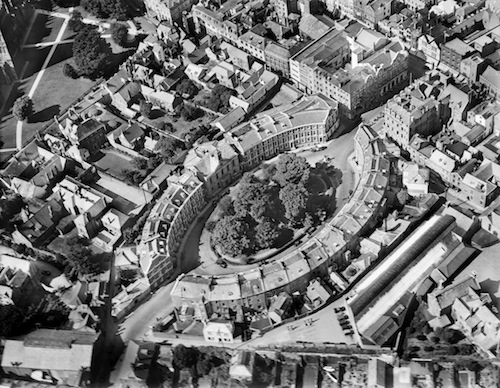
Bedford Circus, Exeter 1928 (image reference EPW024104, copyright English Heritage, reprinted by permission from www.britainfromabove.org.uk).

Dellers Cafe and Martins Bank ruins seen from ruins of Bedford Circus 1942 (reprinted by permission of the Exeter Express and Echo)
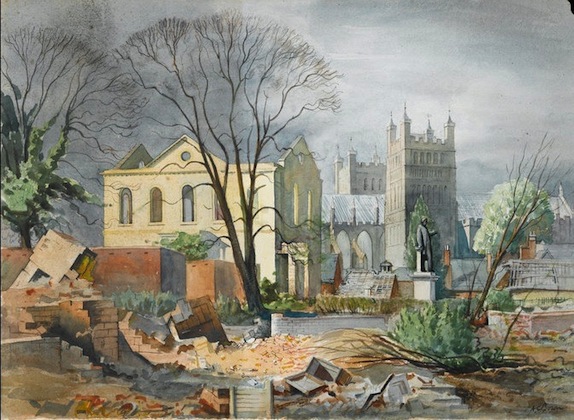
Bedford Circus after the Blitz (watercolour by Albert Charles Bown, reprinted by permission of the Royal Albert Memorial Museum & Art Gallery, Exeter).
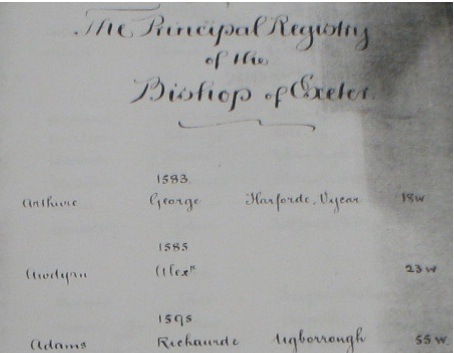
Devon Wills and Administrations: Additions and Corrections 1595-1799 (DWAAC)
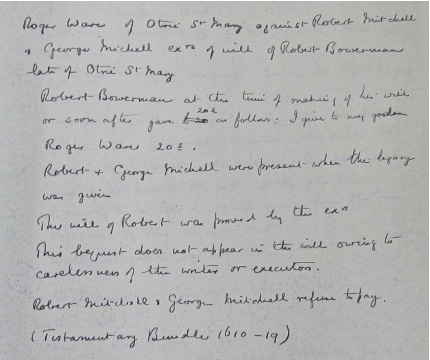
Moger, Olive M., Abstracts of Testamentary Causes (MOGT)
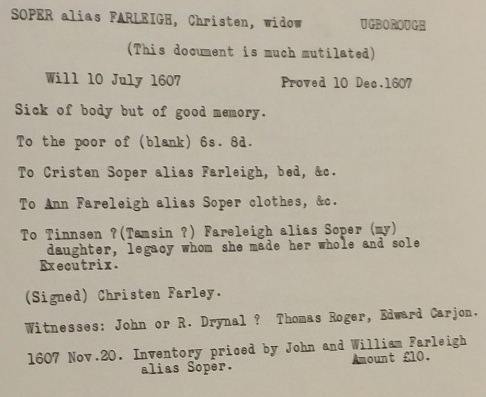
More Oswyn Murray will abstracts (MUR2)
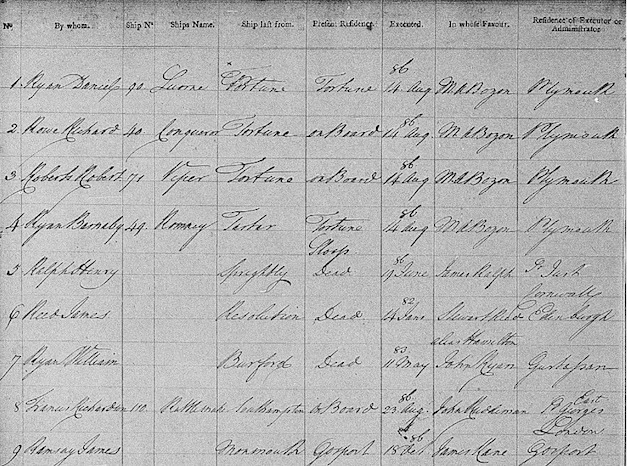
Registers of Seamen's Wills - ADM 142 (NAVY)
